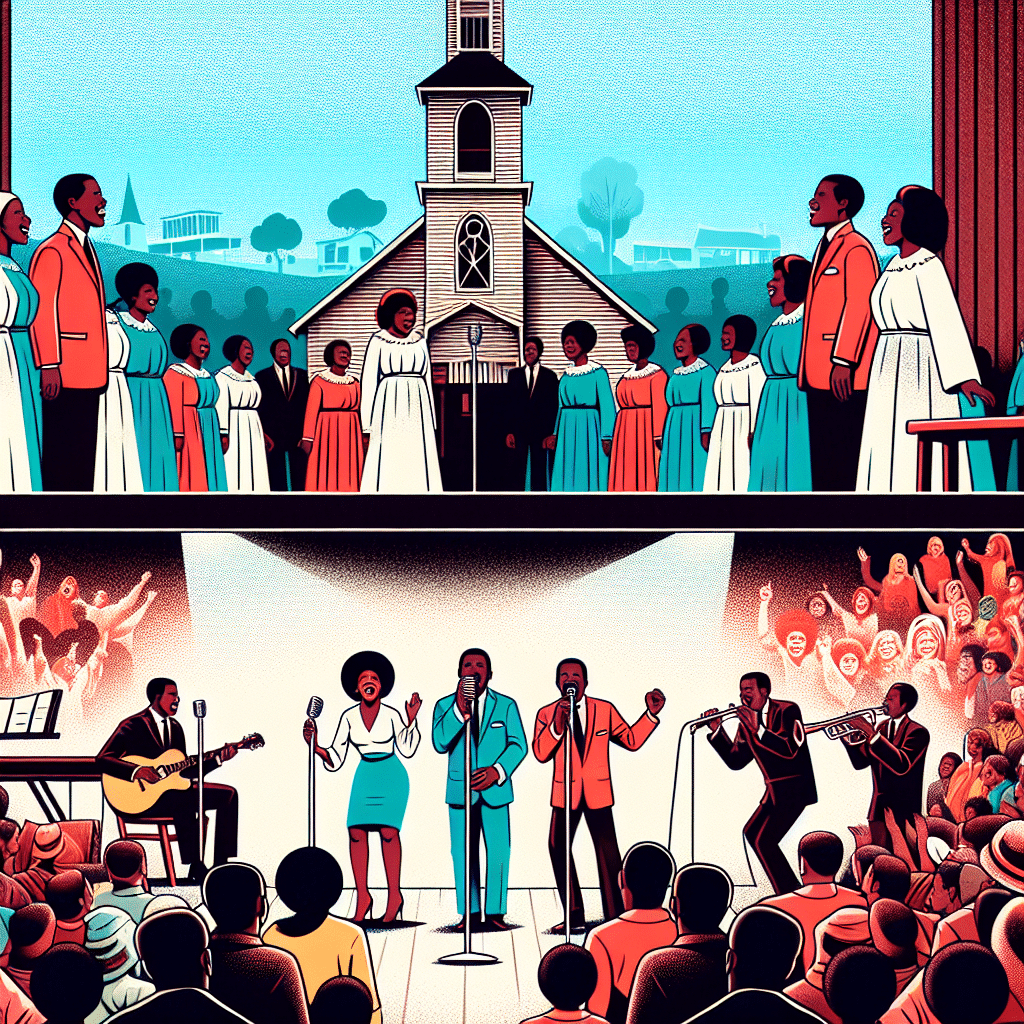From Gospel to Groove: The Origins and Impact of Soul Music in American Culture

Soul music, a genre that emerged in the United States during the 1950s and 1960s, is a vibrant blend of gospel, rhythm and blues (R&B), and jazz. It has since become a significant part of American culture, shifting the landscape of music and influencing various artistic forms and social movements. This article delves into the origins of soul music, its evolution, cultural impact, and contemporary relevance.
The Roots of Soul Music: A Fusion of Genres
The Gospel Influence
Soul music's roots can be traced back to the African American church, where gospel music first flourished. Gospel music's call-and-response patterns, emotional vocal delivery, and spiritual themes laid a foundational groundwork for soul. Prominent gospel artists, such as Mahalia Jackson and Sister Rosetta Tharpe, were instrumental in shaping the genre’s signature sound.
See Also: Rhythms of Emotion: Discovering the Top Soul Artists You Need to Know
Rhythms of Emotion: Discovering the Top Soul Artists You Need to KnowThe Rise of Rhythm and Blues
In the 1940s and 1950s, rhythm and blues emerged as a dominant genre among African American audiences. R&B combined jazz, blues, and gospel elements, focusing on secular themes. Artists like Ray Charles and Ruth Brown paved the way for soul music by merging gospel fervor with R&B's upbeat tempos and secular lyrics.
Birth of Soul
By the mid-1950s, the term "soul" began to be used to define this new musical genre that combined the spiritual yearning of gospel with the rhythmic and melodic intricacies of jazz and R&B. Legendary figures, including Sam Cooke, James Brown, and Aretha Franklin, played pivotal roles in crafting what we now recognize as soul music. Each artist brought their unique influences, helping to shape the genre into a diverse and expressive form.
Evolution of Soul Music in the 1960s and 1970s
See Also: Soulful Ballads: Uniting Generations with Their Emotional Depth
Soulful Ballads: Uniting Generations with Their Emotional DepthMotown and the Southern Soul Sound
The 1960s saw a significant rise in the popularity of soul music, marked by the establishment of Motown Records in Detroit. Founded by Berry Gordy Jr., Motown aimed to produce polished and commercially viable soul music. Acts like The Supremes, The Temptations, and Marvin Gaye contributed to a sound that was rhythmically infectious and commercially lucrative.
Simultaneously, Southern soul emerged, characterized by a rawer sound combining gospel intensity with elements of blues. Artists like Otis Redding, Wilson Pickett, and Al Green embodied this style, allowing their emotional delivery to establish a profound connection with audiences.
Soul Music and Social Change
As the civil rights movement gained momentum, soul music became a powerful expression of African American identity, resilience, and social consciousness. Songs like Sam Cooke's "A Change Is Gonna Come" and Marvin Gaye's "What's Going On" reflected the struggles and aspirations of a community seeking equality and justice. These anthems of hope and resistance captured the sentiments of an entire generation, solidifying soul music's position as not only entertainment but also a catalyst for social change.
See Also: Soul Legends: Celebrating the Pioneers Who Defined a Musical Movement
Soul Legends: Celebrating the Pioneers Who Defined a Musical MovementThe Legacy of Soul Music
Cross-Genre Influences
Soul music's influence extends beyond its boundaries, permeating other genres and shaping the music landscape of the late 20th and 21st centuries. Disco, hip-hop, and contemporary R&B artists have drawn inspiration from the soulful sounds of the past. Icons such as Whitney Houston, Alicia Keys, and Bruno Mars continue to incorporate soul elements into their music, showcasing the genre's lasting impact.
Preservation of Cultural Heritage
Soul music serves as a reflection of African American culture and heritage. Its themes often address love, suffering, joy, and resilience, providing a poignant narrative of the African American experience in the United States. Festivals, tribute concerts, and documentary films have sprung up to honor and celebrate soul music's rich history, ensuring that future generations understand and appreciate its significance.
See Also: Rhythm and Resilience: The Societal Impact of Soul Music Through the Decades
Rhythm and Resilience: The Societal Impact of Soul Music Through the DecadesGlobal Impact
The reach of soul music is not limited to American shores. Artists around the globe, from England's Amy Winehouse to Brazil's Seu Jorge, have embraced the genre, blending it with local sounds and cultures. This cross-pollination has resulted in unique interpretations of soul music, further exemplifying its universal appeal and ability to resonate across cultural boundaries.
Conclusion: The Importance of Soul Music in American Culture
From its gospel origins to its evolution in the context of cultural and social movements, soul music is a vital chapter in the narrative of American music and culture. It transcends mere entertainment to become a form of expression that mirrors the struggles and triumphs of the human spirit. The genre's emotive power and rhythmic appeal not only brought joy and understanding but also sparked dialogue about race, identity, and social justice.
See Also: The Sound of Change: How Soul Music Became the Anthem of a Generation
The Sound of Change: How Soul Music Became the Anthem of a GenerationSoul music remains imperative to understand the cultural fabric of America. It connects generations and continues to inspire artists and audiences alike. As we celebrate soul music, we honor a legacy that shaped society's consciousness and imbued the American musical landscape with an indelible groove.
FAQs
Q1: What are the key characteristics of soul music?
A1: Soul music is characterized by its powerful vocals, heartfelt lyrics, call-and-response patterns, and a combination of rhythm and blues with gospel influence. It emphasizes emotional expression and often addresses themes of love, struggle, and social justice.
Q2: Who are some of the most influential soul artists?
A2: Some influential soul artists include Aretha Franklin, James Brown, Otis Redding, Sam Cooke, Marvin Gaye, and Ray Charles. Each artist contributed uniquely to the genre, helping to shape its sound and message.
 Soulful Sounds: The Top 10 Hits That Shaped the Genre
Soulful Sounds: The Top 10 Hits That Shaped the GenreQ3: How did soul music influence other genres?
A3: Soul music has had a significant influence on various genres including disco, funk, contemporary R&B, and hip-hop. Many artists across these genres have incorporated soul elements, showcasing its wide-reaching impact on popular music.
Q4: Why is soul music considered important in the context of social movements?
A4: Soul music played a critical role in the civil rights movement, serving as a voice for the struggles and aspirations of African Americans. Songs often addressed injustices and inspired hope, becoming anthems for change and resistance.
Q5: Is soul music still relevant today?
A5: Yes, soul music remains relevant today, with contemporary artists continuing to draw inspiration from its sounds and themes. Festivals and celebrations of soul music keep the genre alive, ensuring its legacy endures in modern culture.
If you want to know other articles similar to From Gospel to Groove: The Origins and Impact of Soul Music in American Culture you can visit the category Soul.
